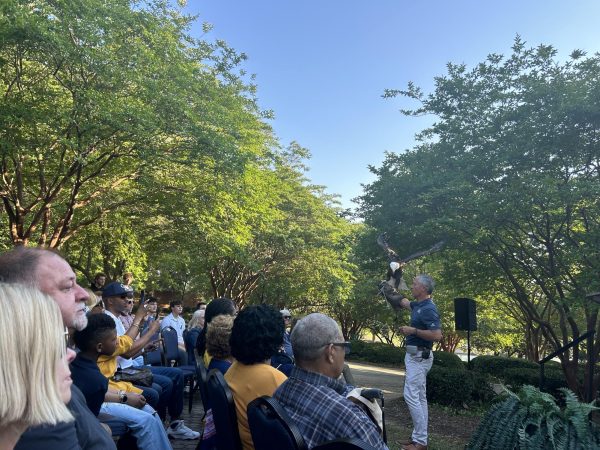GSU faculty show concern over stagnating pay
April 9, 2015
Last Friday, University of Georgia President Jere Morehead wrote an open letter to the Georgia Board of Regents citing sluggish faculty pay increase appropriations over the last few years as a critical problem in recruiting and retaining high quality faculty.
In tune with Morehead, Georgia Southern University President Brooks Keel said, “Georgia Southern and the state of Georgia is losing really outstanding faculty and staff because we’re not able to keep pace with pay.”
Though both presidents, Keel and Morehead, are optimistic that they will be able to give out merit-based pay increases over the next year, GSU will likely receive state funding for a one percent pay increase and a directive from the BOR to match the amount, creating an overall pool of two percent from which to pull money for the increases.
Rob Whitaker, vice president of business and finance at GSU, is the man in charge of university finances and agrees with professors and faculty who say that this round of increases will not be enough.
“Nobody is ever going to be happy, from the very top of the organization to the bottom of the organization,” Whitaker said. “When you go five years without a pay raise and the cost of living doesn’t stop going up, last year’s two percent and this year’s two percent doesn’t mend all the pain that we suffered those years we didn’t get a pay raise.”
Keel, however, sees any pay increase at all as a good thing.
At the Faculty Senate meeting on March 9, Keel reassured the audience that the Chancellor of the Board of Regents and the Governor recognize that Georgia Southern, and other USG institutions, are losing valuable faculty because of proportionally lower pay. He also reiterated that he has been explicitly forbidden to give an across-the-board pay increase, instead in favor for merit-based pay increases.
If granted state funding, GSU will allocate pay increases ranging from zero to four percent for each faculty member based on merit levels determined independently by each subsequent supervisor. The Board of Regents gives the overall two percent pay increase to the president, the president gives it to the vice presidents, and it continues to trickle down until all employees are evaluated.
“We have to be based off of merit, so there will be some people who will get upwards of four percent and some people who will get downwards of zero percent,” Keel said. “That’s the way merit pools work.”
Both Whitaker and the Board of Regents cite the recent economic downturn as explanation for the long period with no pay increase, and Whitaker acknowledges that the upcoming round might not be enough to satisfy some faculty.
“It’s the tough part of being a supervisor,” Whitaker said. “It’s really challenging when you only have the two percent, because then you don’t really have a range that’s wide enough to really reward those high winners… You can go out and ask anybody, faculty, staff, from the highest to the lowest, even the ones that get four percent: is that enough? ‘Probably not, because I suffered five years of nothing.’”














